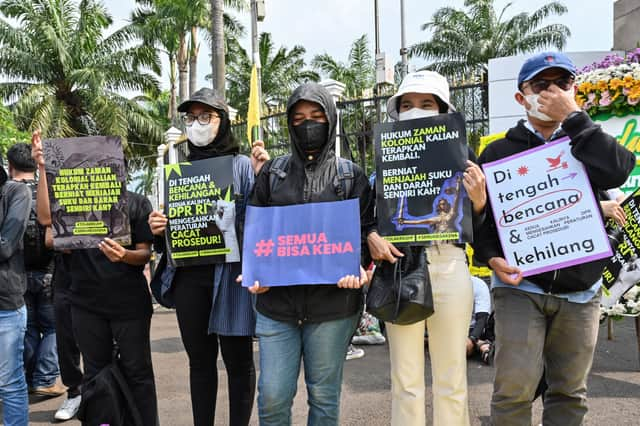Indonesia law: non-marital sex ban, impact on tourism to places like Bali, punishment, reaction - explained


Indonesia has introduced new strict laws around sex outside of marriage and co-habitation before marriage. The parliament overwhelmingly voted to approve the overhaul of Indonesia’s legal code, with all parties unanimously approving the laws.
The laws will be introduced next year. While citizens of the country will be heavily affected, the new legal rules around sex and relationships will extend to tourists to the country.
Advertisement
Hide AdAdvertisement
Hide AdCampaigners have criticised the move, saying that human rights and freedoms are under attack in Indonesia. Critics have also said that the introduction of such types of laws could see a rise in the policing of morality, with the LGBT community and women at risk of having their freedoms restricted.
It comes as the majority-Muslim country marks a shift towards a more religious-influenced way of governing. An earlier draft of the new criminal code was protested by campaigners in 2019, who opposed the religiously-influenced morality laws.
Businesses have also criticised the introduction of the new code, saying it could have a huge effect on the tourism industry and the economy. Millions of travellers visit the country each year, including couples visiting destinations such as Bali. Here’s everything you need to know about the new laws.
What laws have been introduced in Indonesia?
The new criminal code will see sex before marriage outlawed. Sex before marriage was previously already banned, however this was rarely enforced. Unmarried couples will also face criminal punishment if they live together before tying the knot, with the promotion of contraception also banned. Cheating and extramarital affairs are also illegal under the new laws.
Advertisement
Hide AdAdvertisement
Hide AdAlongside laws relating to sex and relationships, there have also been a tightening of the restrictions of freedom of speech. Insulting the President as well as spreading views which contradict Pancasila - the national ideology - will be a criminal offence.
Will tourists be affected by the new laws?
Indonesia has shot up in popularity for couples’ holidays in recent years. Picturesque islands such as Bali and Lombok have welcomed millions of tourists in this time, which generates a huge amount for the Indonesian economy.
However, the tourism industry in the country is warning that the new laws could dampen the tourist trade. The industry is recently getting back on its feet following the Covid-19 worldwide lockdown in 2020.
The new laws will pertain to anyone local to Indonesia as well as those visiting the country. Therefore, unmarried couples who are caught having sex while visiting Indonesia could face criminal punishment, including prison time.
Advertisement
Hide AdAdvertisement
Hide AdMaulana Yusran, the deputy chief of Indonesia’s tourism industry board, insisted that the government had made a mistake by introducing the laws as the tourism industry attempts to bounce back from Covid-19. He said: “We deeply regret the government have closed their eyes.”
What is the punishment for sex before marriage in Indonesia?
The law is expected to be introduced in three years time, and those who break the code will face a criminal punishment. Anyone caught having sex outside of marriage faces up to one year in prison. Adultery will also result in imprisonment. Living with a partner before marriage could see people in Indonesia locked up for six months.
What has been the criticism of the new code?
The new criminal code has been harshly criticised by campaigners and human rights organisations. Usman Hamid, Amnesty International’s Indonesia executive director, described the new code as “appalling”.
He said: “Outlawing sex outside marriage is a violation to the right to privacy protected under international law. Consensual sexual relationships should not be treated as a criminal offence or a violation of ‘morality’.”
Advertisement
Hide AdAdvertisement
Hide AdThere are also fears that it could marginally affect minorities in Indonesia. Andreas Harsano from Human Rights Watch told the BBC that there were millions of couples across Indonesia who live together without a proper marriage licence, which is common “especially among Indigenous peoples or Muslims in rural areas" who have married in rare religious ceremonies, with statistics also showing that women are disproportionarly disciplined under morality laws in Gulf states.
The Indonesian government has responded to criticism through the past few years as drafts of the code have been made. There were numerous protests against it in 2019, however only a dozen protesters turned out in Jakarta on 6 December 2022.
Yasonna Laoly, the minister of law and human rights, told parliament: “We have tried our best to accommodate the important issues and different opinions which were debated. However, it is time for us to make a historical decision on the penal code amendment and to leave the colonial criminal code we inherited behind.”
Comment Guidelines
National World encourages reader discussion on our stories. User feedback, insights and back-and-forth exchanges add a rich layer of context to reporting. Please review our Community Guidelines before commenting.
